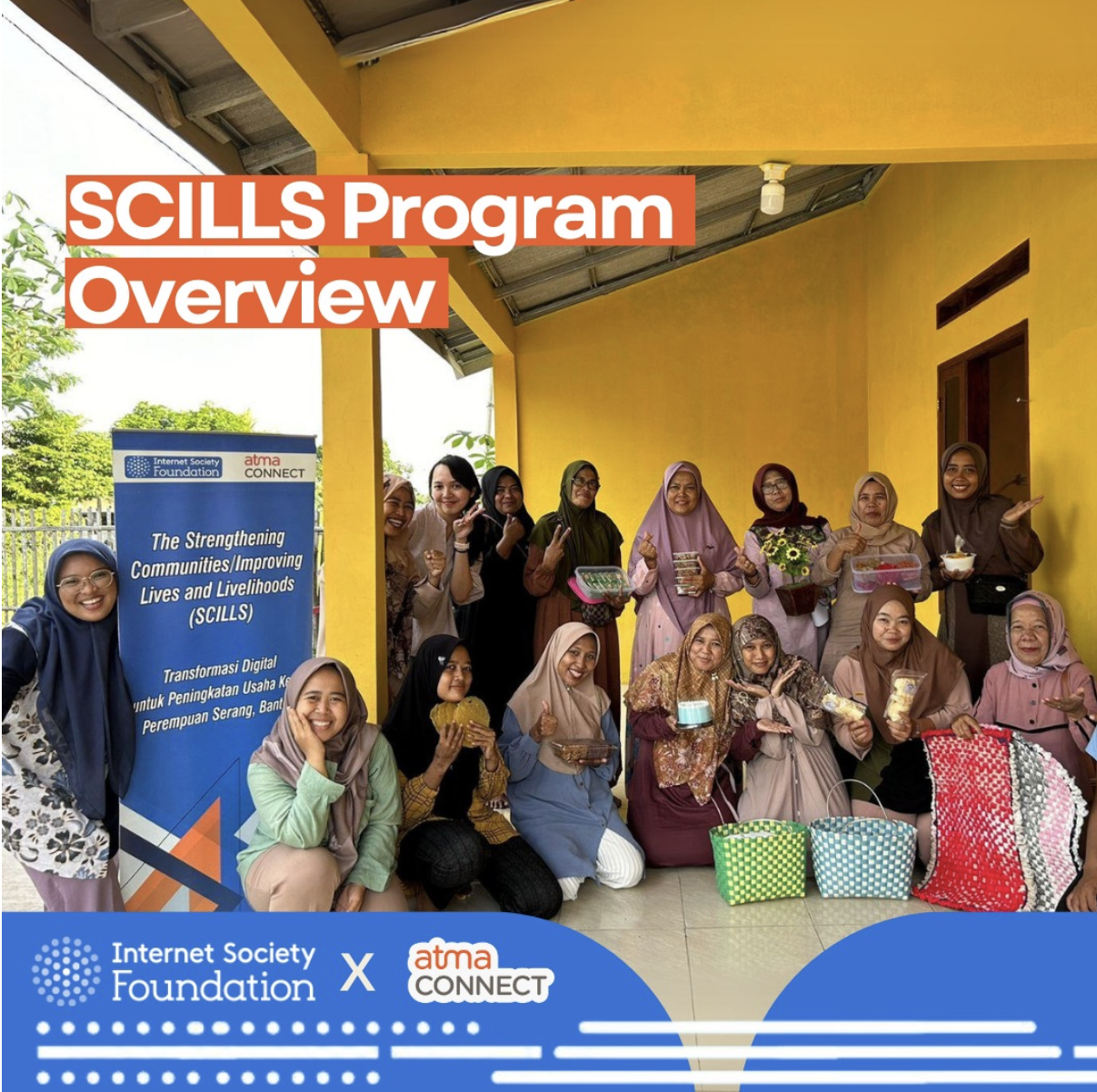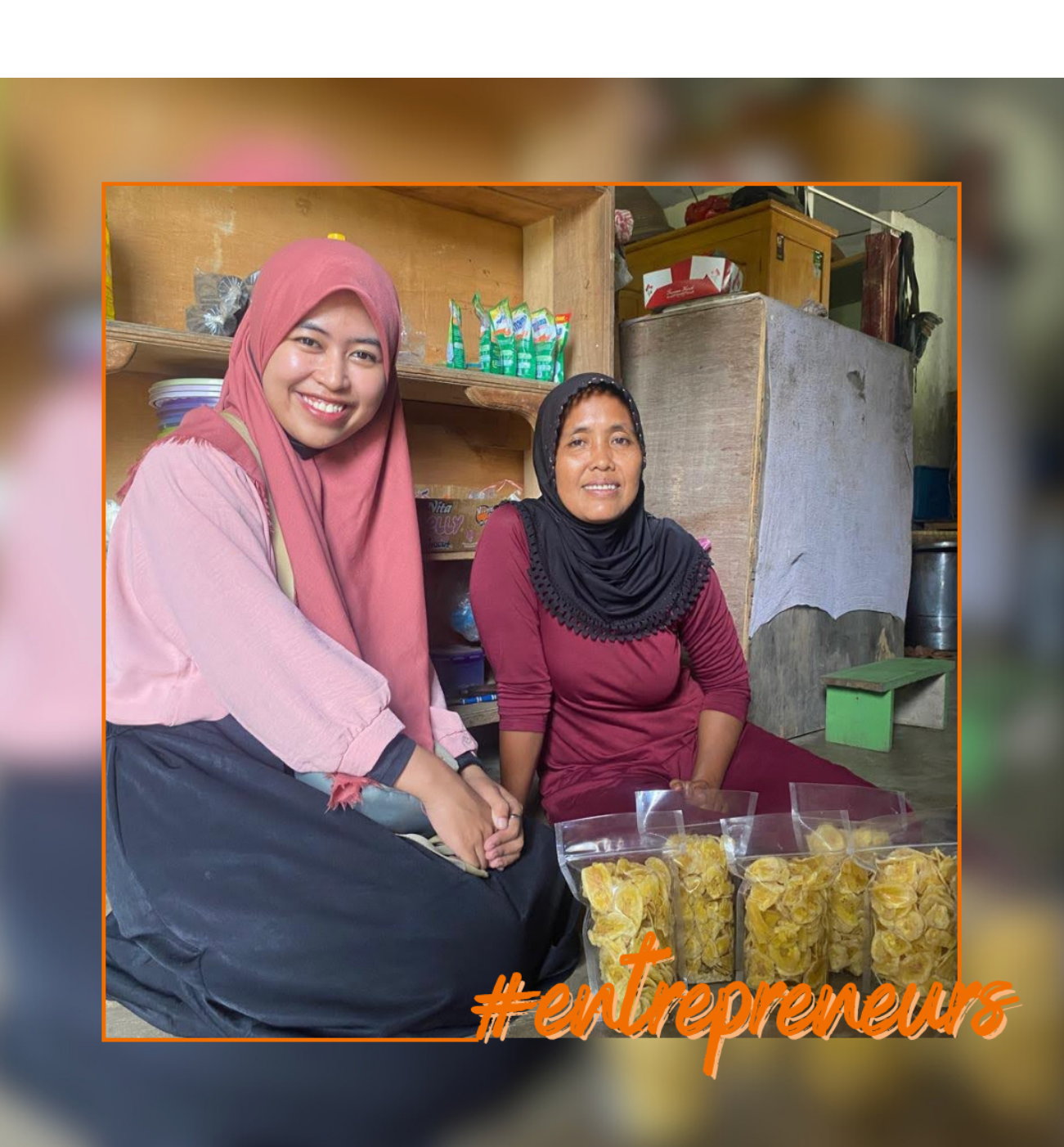Atma Connect, supported by the Internet Society Foundation, has had recent successes in improving economic opportunity for women entrepreneurs. Through an innovative 24-month program 240 women in Indonesia put into practice crucial skills of digital literacy and business to grow their businesses and support their households.
The program is known as SCILLS for Strengthening Communities / Improving Lives and Livelihoods.
 Atma, a leader in empowering locally-led change, shares a summary of lessons learned working with the owners of small businesses in the city and regency of Serang, about 80 kilometers from Jakarta, Indonesia. These SME (small- to medium-sized enterprises) encompass a range of innovative products and services including these:
Atma, a leader in empowering locally-led change, shares a summary of lessons learned working with the owners of small businesses in the city and regency of Serang, about 80 kilometers from Jakarta, Indonesia. These SME (small- to medium-sized enterprises) encompass a range of innovative products and services including these:
- Food items including Naster Cookies by Mrs. Elis Hermawati, which are buttery pastry filled with sweet pineapple jam; while another entrepreneur was known for her Jelly Noodle drinks, and another packaged tasty banana chips
- Bouquets and party backdrops for people and companies hosting parties for many occasions
- Handmade crochet bags by the RKJ Craft collective organized by Mrs. Siti Masitoh
Traditional Bantanese ceremonial daggers made by Mrs. Aminah
Challenges Abounded Before the Program

Before the program, almost none of the participants had used social media for promotion or tried out Indonesia’s numerous and extremely popular e-commerce platforms. They had inadequate tools (mobile phones with no memory space), and many of the women were unused to speaking up in a conservative culture.
With multiple responsibilities and limited time, most said that before the program they didn’t keep track of their business’ finances – meaning these enterprises were literally in the dark about how they were doing.
However, through learning together and building a supportive peer to peer community, participants overcame initial challenges and have made significant progress in their entrepreneurial journeys. Atma’s holistic, women-led, mutual support approach empowered them to achieve growth and sustainability in their businesses.
Here are seven lessons learned:
Build a Foundation of Success
Many participants wanted to increase sales of their products and services yet entered the program feeling unsure about their ability to succeed. Atma’s trainers and mentors focused not only on enhancing business acumen but also on boosting self-confidence. This dual approach equipped participants with the resilience needed to pursue their business goals, regardless of their starting point.
Make Training Accessible

Given the diverse educational backgrounds of participants, Atma adapted training materials to be both relevant and easy to understand. Facilitators used culturally sensitive content that resonated with the local context. Conducting sessions in participants’ native languages and providing personalized coaching further enhanced their understanding of the training. Providing child care when needed also helped make the trainings more accessible.
Clarify Program Objectives
Mentors clarified that the program focused on skill enhancement, not financial aid, aligning participant expectations with overall goals.
Tackle Security and Payment Issues
Concerns about the security of goods delivery and the risks associated with Cash on Delivery (COD) payment methods were prevalent. Mentors addressed these by finding secure logistics solutions and educating participants on reliable payment methods. This approach boosted confidence in the safety of their transactions and the reliability of the delivery process.
Bridge the Generational Gap
Senior participants often struggled with digital marketing concepts. To bridge this gap, mentors formed support groups that paired older participants with younger, more tech-savvy individuals. This setup supported mutual learning and also strengthened the community by leveraging the strengths of each generation.
Ensure a Safe Learning Environment
Cultural sensitivities were a priority in designing our training sessions. In some communities, close interaction with male trainers could cause discomfort among participants. By ensuring a female mentor was always present, we encouraged open communication and effective learning.
Support Digital Connectivity
Many participants faced financial constraints in purchasing internet quotas, which affected their ability to stay connected. To support these entrepreneurs, Smartfren, a telecommunications company, provided free WiFi access at activity centers and introduced an internet quota subsidy program for active SMEs who lacked access. These initiatives ensured continuous online business operations without financial hindrance.
In Sum
Through building confidence, addressing key barriers, and fostering a supportive peer community, participants in the innovative SCILLS program overcame initial challenges and made significant progress in their entrepreneurial journeys.
****
“I am very happy that my small shop is now on Google Maps and has a catalog on WhatsApp, making it much easier for customers to see my products. This has significantly improved my business visibility. Thank you for helping me set this up. Your support has truly made a difference in my business.” – Mrs. Mae, entrepreneur
Fun facts
240 women entrepreneurs
$409,800 (approx) in gross revenue generated (Rp6,661,686,500)
92% of businesses reported an increase in sales, marketing activities, or business profit
57% reported an increase of profit
10 businesses gained access to banking loans or government support
193 social media accounts created
1.9K posts on social
1K subscribers to podcasts sharing the entrepreneurs’ knowledge and wisdom
170 businesses now listed on Google Maps
More: Here’s TV coverage of the SCILLs entrepreneurs from TVRI Jakarta (starts at the 21 min mark).
